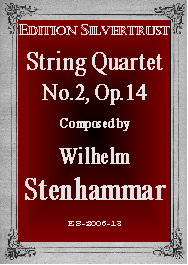Presents
Wilhelm Stenhammar
String Quartet No.2 in c minor, Op.14
 Some critics have
argued that Stenhammar's set of six string quartets is the most important
written between those of Brahms and Bartok. Whether this is so or not, there is
no denying that Stenhammar's quartets represent a very important development
during the twenty five years he was writing chamber music. Tonally, they range
from the middle late Romantics to mature Sibelius. Though not unknown by the
Swedish chamber music public, his string quartets have been sadly neglected
elsewhere.
Some critics have
argued that Stenhammar's set of six string quartets is the most important
written between those of Brahms and Bartok. Whether this is so or not, there is
no denying that Stenhammar's quartets represent a very important development
during the twenty five years he was writing chamber music. Tonally, they range
from the middle late Romantics to mature Sibelius. Though not unknown by the
Swedish chamber music public, his string quartets have been sadly neglected
elsewhere.
Stenhammar (1871-1927) was trained as a pianist, became a virtuoso and was considered the finest Swedish pianist of his time. Concert pianists who venture into the realm of the string quartet often wind up writing compositions which sound like they were composed at, and are perhaps better played at, the piano. This is certainly a valid criticism of some of the quartet writing of both Schumann and Mendelssohn. That Stenhammar's works show no such trait is due entirely to the fact that for nearly half of his life, he worked intimately with the Aulin Quartet, the top Swedish string quartet of its day and one of the best then performing in Europe. In fact, he toured throughout Europe with them for many years and a piano quintet was nearly always featured on their programs. Thus it is no accident that his quartets show a fine grasp of instrumental timbre and technique. The part writing is sure and evenly distributed with the instruments never being asked to perform in a non-violinistic manner.
Stenhammar was not what the Germans call a "Vielschreiber", writing only some 45 works. Of the various genre in which he composed, none occupied him more than that of the string quartet and, they are, to be sure, among his finest works.
Although indebted to Beethoven, Stenhammar's Second Quartet, dating from 1898, was really his first major chamber work full of original ideas and construction, and the first of a series of very important string quartets. The extraordinary opening movement Allegro moderato, begins mysteriously but quickly builds into a powerful and deeply troubled mood with an implacable "stamping" rhythm as a kind of inexorable background. Next we hear an elegaic and reflective Andante, quasi adagio. In the restless scherzo, Allegro vivace, Stenhammar quotes the main theme from the scherzo of Beethoven's Op.95 quartet. His treatment is at once clever, highly imaginative and very effective. The finale, Allegro energico e serioso, once again, drama and pathos return in the form of harsh and short "stamping" rhythms which are juxtaposed against a wild moto perpetuo theme. Unique sounding, this is unquestionably a work whose originality and quality clearly mark it for the concert hall.
Parts: $24.95
Parts & Score: $31.95